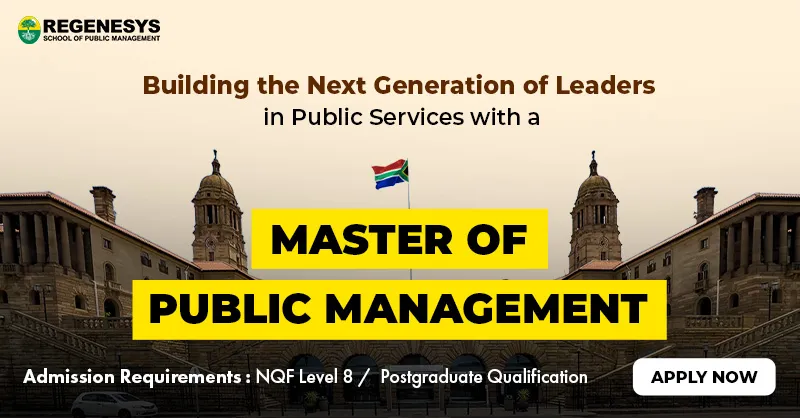Government professionals face ever-evolving challenges in Public Management, which consolidates administration, policymaking, and service provision. To address these issues and improve their capabilities with the necessary technical know-how and expertise, many talented students are pursuing higher degrees in Master of Public Management (MPM) in South Africa. Such programmes serve as catalysts for career development and, to the advantage of this sector, offer a comprehensive education suitable for governmental roles.
This article sheds light on the programme’s structure, its duration and the opportunities it provides aspiring public management professionals.
Table of Contents
What is a Master Of Public Management?
Master’s of Public Management programmes are postgraduate degrees that prepare interested students for government and public sector leadership roles. These programmes go beyond typical management academics; Public Management degrees place more emphasis on the unique challenges within the complex realm of public administration and service delivery. MPM graduates possess a wide range of abilities categorised under policy analysis, organisational administration, financial management, ethics and governance, and strategic planning. The core focus of a Public Management Master’s degree is to concentrate on applied and real-world problem-solving, providing graduates with opportunities to become agents of development and participate in and lead change within government agencies, non-profit organisations, and international development institutions.

Structure of MPM
The structure of Master of Public Management programmes in South Africa is designed to provide students with a comprehensive understanding of public management principles and practices. Typically, these programmes combine core practices, elective modules, and practical components such as internships or research dissertations.
Core Modules:
Core modules serve as the foundation of the curriculum, covering essential topics such as public policy analysis, organisational behaviour, financial management, and public sector ethics. These modules provide students with a solid theoretical framework and equip them with the fundamental skills needed to steer the complexities of public management.
Elective Modules:
In addition to core modules, Public Management degrees offer a variety of elective modules that allow students to customise their education to their specific interests and career goals. These elective modules cover a wide range of topics, including areas such as public sector economics, development studies, environmental policy, and digital governance. By selecting elective modules that align with their interests and career aspirations, students can deepen their knowledge in specialised areas and enhance their capabilities in the job market.
Internship:
The key appreciated components of MPM programmes are the practical components, including internships and research assignments, which provide students with real-time experience. Internships are essential for professional growth as they allow students to cooperate with professionals working in government agencies, non-profit organisations, or the non-governmental sector and better understand the role of public sector organisations in state development. While working on research projects, students are able to apply their theoretical knowledge and conduct in-depth research to solve actual problems. Moreover, this can help to come up with recommendations that are actionable for policymakers and practitioners.
Dissertation:
A dissertation in the Master of Public Management and Governance programmes plays a crucial part wherein students conduct original research on subjects in public management. Students will start with a topic that matches their interests and the programme goals afterwards. Prior to research, they will have the chance to perform a comprehensive literature review and find gaps in the literature by refining their research questions. Next, researchers develop their study methodology, picking between qualitative or quantitative approaches, data collection style, as well as analytical techniques. A dissertation provides an opportunity for students to consolidate their studies and demonstrate their ability to use theory and research competencies in tackling practical problems of public management.
Understanding the Duration of MPM
The MPM programmes offered in South African schools and institutions can differ depending on the mode of study, student’s academic backgrounds, and prior experiences in public management or any corresponding field.
Full-time master’s programmes in MPM typically last two years, engaging students in extensive coursework and practical experiences. These programmes are well-tailored for recent graduates as well as individuals who wish to advance to a career in public service on a full-time basis. In addition to full-time options, part-time alternatives are available for professionals already holding jobs, creating a flexible learning environment where students can integrate their classes with their professional and personal lives. Part-time MPM programmes are designed to be completed in two to three years, with class meetings scheduled for evenings or weekends, providing a flexible opportunity for working professionals.
The length of an MPM programme can be influenced by a student’s academic background and previous experience in the field of public management. Some institutions offer exemptions and credit transfers for students who have obtained related undergraduate qualifications or professional experience, thereby shortening the programme duration.
Regenesys School of Public Management offers a two-year holistic MPM programme that equips you with skills to shape your future in public sector leadership. Begin your impactful journey now!

Conclusion
In conclusion, the two-year duration of Master of Public Management (MPM) programmes in South Africa offers a comprehensive educational experience. It allows students to delve into core modules, electives, internships, and research projects. Core modules establish foundational principles, electives tailor education to interests, internships provide practical experience, and research projects apply theoretical knowledge. This duration prepares students for government and public sector leadership, emphasising lifelong learning and impactful contributions.
With a focus on excellence and practical skills, Regenesys’s Master of Public Management programme equips you with the skill set to make a real impact in the public sector. Start your journey to transformative leadership today.
FAQs on How Long Does It Take to Complete a Master of Public Management?
What are the MPM requirements?
The prerequisites of the MPM programme are as follows:
Attainment of an Honours degree at NQF Level 8
Completion of a Postgraduate Diploma at NQF Level 8
Achievement of a Professional bachelor’s degree at NQF Level 8
Can I do a Master of Public Management online?
Yes, some universities do provide Master in Public Management(MPM) programmes that are undertaken online. These online programmes are an outstanding benefit to working professionals or to those not able to attend traditional on-campus degrees. Online MPM programmes are designed to impart the same knowledge and offer the same opportunities for specialisation, internships, and research projects as their on-campus equivalents.
What are the MPM career opportunities for graduates?
MPM graduates can pursue careers in government administration, nonprofit organisations, international organisations, consulting firms, and academia.
Here are some MPM job titles that graduates can pursue: Policy Analyst, Programme Manager, Government Relations Specialist, Public Affairs Officer, Nonprofit Manager, International Development Specialist, Consultant (Public Sector), Research Analyst, Public Policy Advisor, Public Sector Administrator
Define the MPM modules?
Master of Public Management modules typically cover subjects such as public policy analysis, organisational management, financial management, leadership, and strategic planning within the public sector. These modules aim to equip students with the skills and knowledge necessary for effective management and leadership in government and nonprofit organisations.
Which are the best public management schools in South Africa?
Regenesys School of Public Management stands out as one of the leading institutions, offering exceptional public management and governance programmes. If you’re looking to excel in the public sector, consider Regenesys for its innovative approach to education and practical learning experiences. Explore Regenesys today to start your journey towards a revolutionary career in public management.







